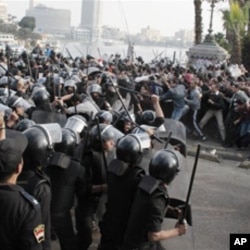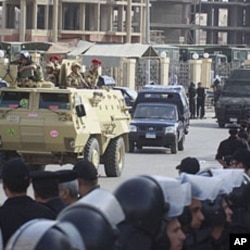As Egypt looks into alleged crimes by its former president and charges other former top officials with corruption and brutality, some are questioning how far the country should go in pursuing justice.
Egypt's top cleric hurriedly issued a clarification this week after German media quoted him as saying former President Hosni Mubarak, now old and sick, had done much for his country, so mercy should prevail over justice. The Grand Sheikh of al-Azhar, Ahmed el-Tayeb, says his words were distorted and stressed that, "no one is above the law."
The question of justice is very much on Egyptians' minds, but just how to apply the law is up for debate. The Mubarak family has been interrogated, and the president's two sons are being held in prison.
But Said Sadek, a political sociologist at the American University in Cairo, says Egypt has rejected the models seen in such post-revolutionary states as Iran in 1979 and Romania a decade later.
"We do not have revolutionary tribunals because it will not be able to stop it once the wheel of the revolutionary violence rolls," he said. "It can catch up a lot of people and lead to more blood. It is against the nature of the Egyptian people. You just remember that every revolution follows the culture of the people."
While Sadek argues that Egyptian society is a moderate one, he acknowledges the alleged crimes are severe: hundreds of people killed in the uprising earlier this year, untold numbers tortured in the government's prisons over the past thirty years and billions of dollars missing.
Hisham Kassem, a publisher who frequently ran afoul of the Mubarak system, argues justice can be found, especially in such concrete matters as stolen property, no small concern in a country where nearly half the people earn about two dollars a day.
"When we look deeper into the Mubarak practices, specifically on the corruption issue, it is not something where a pardon can be issued by anybody," said Kassem. "These are serious corruption charges and if they go by without accountability, it is not going to set a very good precedent for the future.
The president's wife, Suzanne Mubarak, was released from custody last week after promising to turn over millions of dollars worth of property and other assets. The Justice minister indicates that's as far as her case will go.
But public anger continues, fueled in part by both Mr. and Mrs. Mubarak pleading illness as a reason to postpone questioning -- a tactic professor Sadek compares to a student trying to get out of an exam, and says is equally unconvincing.
Despite some hints from officials that the former president could be shown leniency, the government, like the Grand Sheikh, has responded to a public outcry and said justice will be served.
Other leaders are also being pursued; a second trial of the former Interior Minister, Habib al Adly, already sentenced to 12 years in prison, got underway Saturday.
Adly's first trial was for corruption, but he was more widely despised for overseeing a security system where torture was widespread and, during the recent uprising, was blamed for killing protesters.
That implicates a far broader group of people, the hundreds, perhaps thousands of people who applied the former government's injustice.
Democracy advocate Kassem argues for a nationwide approach, as seen in post-apartheid South Africa, to come to terms with the trauma.
"The application of a truth and reconciliation model a la South Africa is a necessity because the practices have been grave and have extended over 30 years," he said. "It is, practically, not possible to hold everybody accountable.
"But then the matter cannot be just brushed past as if it has never happened," continued Kassem. "So, in lots of cases people would need to at least admit guilt before they can be pardoned and move on,"
American University in Cairo's Sadek disagrees, calling for the court trials of those who carried out the dictates of a police state - in part to prevent another police state in the future.
In the first such case, a policeman Saturday was sentenced to death for killing 20 protesters earlier this year. Sadek says reconciliation should be an option, but would leave it up to the victims and their families to decide.
"Any victim once he gets his right and there is acknowledgment by the court that his rights have been abused, they are the only people in the world who are entitled to decide whether they give it up or, you know, forgive the guy or not," said Sadek. "If somebody has been killed, how can we tell them, please forgive the guy who killed your son or your daughter."
As Egypt decides how to deal with its past and plots its path forward, others in the region are paying close attention. According to Hisham Kassem, for leaders in Libya, Yemen, Syria, and elsewhere that governments face uprisings, the idea of not only having to leave office, but be punished for their rule, is adding another layer of fear.
The Gulf is terrified by what is happening," said Kassem. "They are very annoyed at the fact that Mubarak and family are being put on trial. Across 22 Arab counties, it is sending a chilling message and they find it extremely disturbing because it could start encouraging people, putting ideas in their heads across the region."
Sadek agrees, adding that the trials may embolden the leaders to fight to the end. But even without trials, he says the uprisings, at least in Egypt, have already provided a certain sense of justice.
"What is stronger than the legal trial of Mubarak is the political and moral trial of the Mubaraks," he said. "They have been totally killed morally and politically. They lost all their legitimacy, [there is] no respect."
In Sadek's view, for once all-powerful rulers, that may be more painful than a death sentence.

















